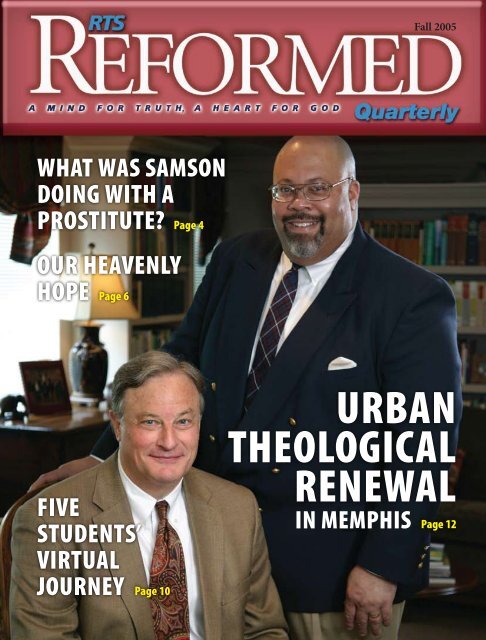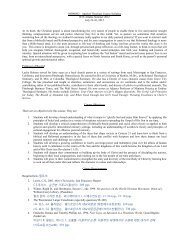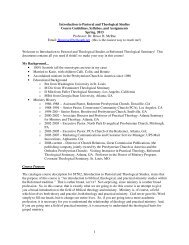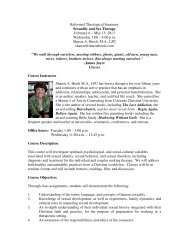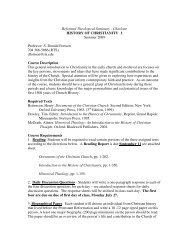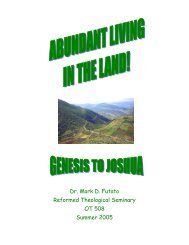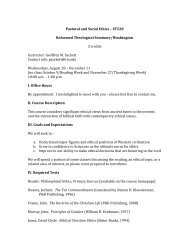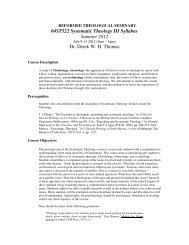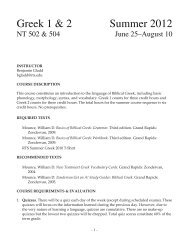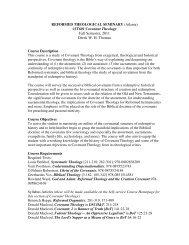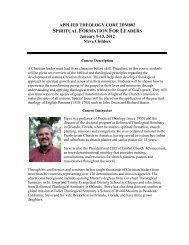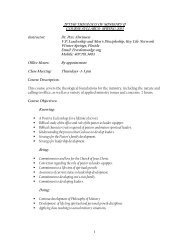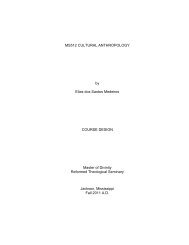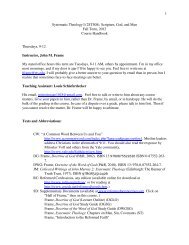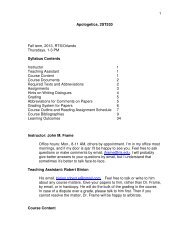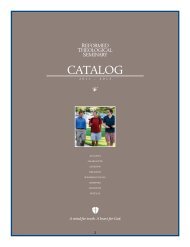URBAN THEOLOGICAL RENEWAL - Reformed Theological Seminary
URBAN THEOLOGICAL RENEWAL - Reformed Theological Seminary
URBAN THEOLOGICAL RENEWAL - Reformed Theological Seminary
Create successful ePaper yourself
Turn your PDF publications into a flip-book with our unique Google optimized e-Paper software.
Fall 2005<br />
What Was Samson<br />
Doing With a<br />
Prostitute? Page 4<br />
Our Heavenly<br />
Hope Page 6<br />
Urban<br />
<strong>Theological</strong><br />
Five<br />
Students’<br />
Virtual<br />
Journey Page 10<br />
Renewal<br />
in Memphis<br />
Page 12
Chancellor’s Message<br />
Dr. Robert C. Cannada Jr.<br />
How will you be remembered<br />
by family and friends? As<br />
a servant of Christ? An<br />
encourager of others? One<br />
who builds up people in the faith? What<br />
will be your spiritual legacy?<br />
We hear much about “legacy” today,<br />
often referring to financial stewardship—leaving<br />
a significant portion of<br />
one’s estate for the benefit of others. This<br />
is an important consideration; you can<br />
make a significant impact on the world<br />
through such gifts.<br />
But what about your personal spiritual<br />
legacy? It would serve us well to spend as<br />
much time planning how we can personally<br />
influence the spiritual development<br />
of the people God has put in our lives as<br />
we do in planning our estate distributions<br />
before our homegoing.<br />
At RTS we are concerned with our<br />
students’ spiritual legacy. We desire that<br />
each one not only grow in their knowledge<br />
of the Bible but also leave a legacy<br />
of God-honoring ministry. We desire for<br />
students to develop a zeal for winning<br />
people for Christ and nurturing them in<br />
their faith. A godly spiritual legacy, as<br />
we like to say, requires a mind for truth<br />
and a heart for God.<br />
These words, though, are more than a<br />
mission statement; they are a way of life.<br />
Our sovereign God graciously allows us<br />
to train His church leaders who are literally<br />
circling the globe with biblical truth<br />
and leaving a spiritual legacy wherever<br />
they serve. Whether a homemaker teaching<br />
Sunday school to Canadian women<br />
or a translator of Christian materials in<br />
Belarus, RTS students have an influence<br />
that transcends classroom walls, creating<br />
a lasting legacy of God’s grace.<br />
An increasing number of our students<br />
receive biblical and theological instruction<br />
while remaining rooted in the mission<br />
fields to which God has called them.<br />
The students mentioned above have participated<br />
in the RTS Virtual Campus (see<br />
page 10). Through this unique program,<br />
a student can complete 90 percent of the<br />
requirements toward a master’s degree in<br />
religion entirely online.<br />
We also creatively offer seminary education<br />
in new places in other ways.<br />
In Tennessee, the Memphis Center for<br />
Urban <strong>Theological</strong> Studies, co-founded<br />
by local pastor Sandy Willson (see page<br />
12), brings accredited, <strong>Reformed</strong> theological<br />
training to the inner city. We at<br />
RTS are pleased to be one of the academic<br />
partners for MCUTS, with RTS<br />
adjunct professor Tim Russell serving as<br />
its president.<br />
As technology enables communication<br />
to cross previously impenetrable borders,<br />
and as the resulting interaction between<br />
previously isolated people requires a new<br />
level of cooperation within the body of<br />
Christ, ministries like RTS must meet<br />
the subsequent challenges. If we are serious<br />
about making <strong>Reformed</strong> theological<br />
education available, accessible and flexible,<br />
then we must make ourselves available,<br />
accessible and flexible to God’s<br />
kingdom around the world.<br />
May this be our legacy: making ministry<br />
preparation available to everyone<br />
through various means so as to be faithful<br />
to God’s Word and a witness of His<br />
presence in our lives, resulting in each<br />
RTS student being remembered for having<br />
a mind for truth and a heart for<br />
God—a faithful spiritual legacy. ◆<br />
Fall 2005 • www.rts.edu<br />
On the Cover: Sandy Willson (seated) and Tim Russell<br />
serve inner-city churches through the Memphis Center for<br />
Urban <strong>Theological</strong> Studies (see page 12 for an interview<br />
with Dr. Willson).<br />
Lyn Perez, Editor in Chief<br />
Paul Schwarz, Managing Editor<br />
LetterWorks, Graphic Design<br />
Sherry Hatfield, Editorial Assistant<br />
The Atlanta Campus<br />
rts.atlanta@rts.edu<br />
The Boca Raton Campus<br />
rts.boca@rts.edu<br />
The Charlotte Campus<br />
rts.charlotte@rts.edu<br />
The Jackson Campus<br />
rts.jackson@rts.edu<br />
The Orlando Campus<br />
rts.orlando@rts.edu<br />
The Virtual Campus<br />
distance.education@rts.edu<br />
The Washington Campus<br />
rts.washington@rts.edu<br />
All campuses<br />
1-800-543-2703<br />
RTS <strong>Reformed</strong> Quarterly<br />
is the official magazine of<br />
<strong>Reformed</strong> <strong>Theological</strong> <strong>Seminary</strong>.<br />
The material in this magazine is copyrighted.<br />
For permission to reprint, please contact<br />
Lyn Perez, Editor in Chief, at (407) 366-9493 or lperez@rts.edu.<br />
Inside This Issue<br />
RTS At Work 3<br />
Judging Samson 4<br />
Our Heavenly Hope 6<br />
Partners in the Harvest 8<br />
Virtual Reality 10<br />
On the M-Cutting Edge 12<br />
2 <strong>Reformed</strong> <strong>Theological</strong> <strong>Seminary</strong>
RTS at Work ...<br />
PUBLICATIONS<br />
» Dr. Robert Cara, professor of New Testament,<br />
RTS-Charlotte, and chief academic officer for RTS,<br />
wrote a review of Colin R. Nicholl’s book From<br />
Hope to Despair in Thessalonica: Situating 1 and 2<br />
Thessalonians, published in Themelios 30 (2005): 93.<br />
» Dr. John Frame, professor of systematic theology<br />
and philosophy, RTS-Orlando, reviewed Brian<br />
McLaren’s article “A<br />
Generous Orthodoxy,”<br />
which will be published<br />
in Reformation<br />
and Revival Journal<br />
later this year.<br />
» Dr. Charles E.<br />
(Chuck) Hill,<br />
professor of New<br />
Testament, RTS-Orlando, reviewed Brian E. Daley’s<br />
“The Hope of the Early Church: A Handbook of<br />
Patristic Eschatology” for the Journal of Ecclesiastical<br />
History 56 (2005) 123. His book The Johannine Corpus<br />
in the Early Church (Oxford University Press, 2004),<br />
was the featured book in the May 2005 issue of The<br />
Expository Time.<br />
» Dr. Frank A. James III, president and professor<br />
of historical theology, RTS-Orlando, wrote an<br />
article titled “Pietro Martire Vermigli,” in Dizionario Di<br />
Teologia Evangelica (eds. Pietro Bolognesi, Leonardo<br />
De Chirico and Andrea Ferrari; Padova: Caltanissetta),<br />
scheduled for publication in 2006.<br />
» Dr. David H. Jussely, associate professor<br />
of practical theology, RTS-Jackson, wrote an article<br />
titled “Lectio Continua: The Best Way to Teach and<br />
Preach the Bible,” published in the Banner of Truth<br />
Magazine (April 2005). This article was also published<br />
in a festschrift titled Interpreting & Teaching the<br />
Word of Hope: Essays in Honor of Jack Brown Scott<br />
(Presbyterian Press, 2005).<br />
» Dr. Reggie Kidd, professor of New Testament,<br />
RTS-Orlando, has completed the four-volume set<br />
The Heart of Paul’s Theology (Third Millennium,<br />
summer 2005), by finishing volume 3 (“Paul and<br />
the Thessalonians”) and volume 4 (“Paul and the<br />
Corinthians”). A new five-part series, Paul’s Prison<br />
Epistles, is in production. Dr. Kidd wrote an article<br />
titled “Getting Perspective on Justification,” published<br />
in By Faith (Presbyterian Church in America), May/<br />
June 2005.<br />
» Dr. Simon Kistemaker, professor emeritus<br />
of New Testament, RTS-Orlando, has written an article<br />
titled “Jesus as Story Teller: Literary Perspectives<br />
on the Parables,” published in The Master’s <strong>Seminary</strong><br />
Journal (Spring 2005).<br />
» Dr. Samuel H. Larsen, academic dean and<br />
vice president for international doctoral programs,<br />
RTS-Jackson, wrote an article titled, “A Christocentric<br />
Understanding of Linguistic Diversity: Implications<br />
for Missions in a Pluralistic Era,” to be published<br />
soon in the Occasional Bulletin of the Evangelical<br />
Missiological Society.<br />
CAMPUS<br />
EVENTS<br />
RTS-Charlotte<br />
» Starting in September, campus president Frank Reich<br />
will host informal lunch meetings on campus for RTS<br />
friends every second Thursday. For more information,<br />
contact Aynn Gehron at (704) 366-5066 or agehron@<br />
rts.edu.<br />
» On Sept. 13, Dr. Carl Ellis, African-American PCA pastor,<br />
will speak on “Islam in America.”<br />
» Sept. 27-30: A “Christian Character Tour” will be<br />
offered. For more information, contact Luther Bigby<br />
at (704) 366-5066 or lbigby@rts.edu.<br />
» Oct. 20: The annual Friends of RTS dinner will be<br />
held. For more information, contact Charlie Dunn at<br />
(704) 366-5066 or cdunn@rts.edu.<br />
RTS-Jackson<br />
» Sept. 13-15: Missions Conference with Dr. Roger<br />
Greenway, professor emeritus of world missions,<br />
Calvin <strong>Theological</strong> <strong>Seminary</strong>.<br />
» Nov. 3: John Reed Miller Lectures and Pastor’s Day<br />
with Dr. Sinclair Ferguson, professor of systematic<br />
theology, Westminster <strong>Theological</strong> <strong>Seminary</strong>, Dallas.<br />
RTS-Orlando<br />
» Beginning in the fall, the campus library will sponsor<br />
a “One School, One Book” program. The seminary<br />
community will read a book and reflect on it corporately<br />
throughout the semester, both in the classroom<br />
and beyond. This fall’s book is Truth in All Its<br />
Glory (P&R Publishing, 2004), by Dr. William Edgar,<br />
professor of apologetics at Westminster <strong>Seminary</strong>,<br />
Philadelphia. Dr. Edgar will discuss his book at a<br />
lunch and dessert Nov. 4. For more information, e-<br />
mail Keely Leim at kleim@rts.edu.<br />
» Sept. 14-16: The Spiritual Life Conference, co-hosted<br />
with Chosen People Ministries, will feature various<br />
speakers addressing the subject “Jewish Evangelism.”<br />
Topics include “The Historical Involvement of the<br />
Presbyterian Church in Jewish Evangelism,” “Practical<br />
Application of Messianic Prophecy in Jewish<br />
Evangelism,” and “Evangelizing and Discipling Jewish<br />
People Through Your Local Church.”<br />
» Nov. 11-12: Synergy 2005—sponsored by RTS,<br />
Whitby Forum and Campus Crusade for Christ.<br />
Synergy is a national forum where evangelical<br />
women can network, share resources, and hone<br />
leadership and ministry skills. For more information,<br />
visit http://synergy.rts.edu.<br />
RTS at Work Continued on Page 15<br />
Fall 2005 3
JUDGING<br />
SAMSON<br />
by Miles Van Pelt<br />
Of all the judges in the Book of<br />
Judges, Samson is perhaps the<br />
most memorable. Who can forget<br />
his miraculous birth, long hair, feats<br />
of strength, his Philistine bride, the prostitute<br />
in Gaza, or Delilah? Undoubtedly,<br />
young children are mesmerized by his<br />
strength—how many people have killed<br />
a thousand aggravated warriors with the<br />
jawbone of a donkey?<br />
Most of us, however, remember Samson<br />
because we identify with him: “Samson<br />
was a sinner, and so am I; if God can<br />
use Samson, then surely God can use<br />
me.” In fact, we are probably drawn to<br />
Samson because we believe he sinned<br />
in ways greater than most of us. After<br />
all, he tried to marry the enemy—a Philistine!<br />
He killed hundreds and thousands<br />
of men for what sometimes merely<br />
amounted to a lost wager and the mistreatment<br />
of his fiancée. He “slept” with<br />
a prostitute and destroyed public property.<br />
Let’s face it—this type of drama<br />
only exists in R-rated movies. So we reason<br />
that if God can love and use someone<br />
as “sinful” as Samson, then maybe<br />
He can love and use us.<br />
I wonder, however, if this interpretation<br />
is correct. Does Samson’s story exist<br />
only to make us feel better about ourselves,<br />
or is there more to it? Did the author<br />
of Hebrews include Samson in the<br />
“Hall of Faith” (Hebrews 11:32,33) for<br />
our self-esteem or for the faithful execution<br />
of his judgeship?<br />
To demonstrate this, consider one of<br />
Samson’s so-called less-than-kosher<br />
episodes: his night with a prostitute in<br />
Judges 16:1-3. In this short, enigmatic<br />
account, Samson travels to Gaza, spends<br />
half the night with a prostitute, steals the<br />
city gates, and then travels with them on<br />
his back for some 40 miles to Hebron.<br />
Was this a night of frustrated passion<br />
culminating in an act of rage, as some<br />
commentators suggest? Perhaps, but<br />
probably not.<br />
What in the<br />
world<br />
was he<br />
doing with a<br />
prostitute?<br />
Samson’s visit to Gaza introduces us<br />
to the second part of his life and his wellknown<br />
encounter with Delilah. It is,<br />
therefore, no accident that Samson visited<br />
a prostitute in Gaza in 16:1-3. This is<br />
the same Philistine town to which he will<br />
be taken captive (16:21) and in which he<br />
will kill more Philistines in death than<br />
in life (16:30). In other words, Judges 16<br />
is about Samson’s overthrow of the Philistine<br />
stronghold in Gaza by way of his<br />
associations with two women of questionable<br />
character.<br />
How, then, does this episode with a<br />
prostitute set us up for the rest of the<br />
chapter? How does Samson’s so-called<br />
“evening of indiscretion” relate to the<br />
eventual overthrow of Gaza? To answer<br />
these questions, we must ask two others:<br />
What was Samson doing with a prostitute,<br />
and did Samson have sex with her?<br />
Let’s begin with the second question,<br />
which focuses us on verse 1. Most commentators<br />
say Samson did engage in illicit<br />
sexual activity, and most translations<br />
leave little doubt. However, the<br />
Hebrew text is ambiguous and does not<br />
necessarily imply this. Verse 1 states that<br />
“Samson went to Gaza, saw a prostitute<br />
there, and he came to her.” The last part<br />
of this verse, two Hebrew words literally<br />
rendered “and he came to her,” is translated<br />
differently by modern translations.<br />
The NIV says “he went in to spend the<br />
night with her,” and the ESV and NASB<br />
go even further, saying “and he went into<br />
her.” These euphemistic translations imply<br />
that Samson had sex with the prostitute.<br />
Such renderings are certainly possible,<br />
and this expression does constitute<br />
one of the ways the Hebrew language<br />
speaks of sexual activity (Genesis 38:18;<br />
Ezekiel 23:44; 2 Samuel 12:24).<br />
This Hebrew expression, however,<br />
does not always carry the nuance of sexual<br />
innuendo. A prime example appears<br />
in Judges 4:22, where Barak enters the<br />
tent of Jael in pursuit of Sisera, the commander<br />
of the Canaanite army. The exact<br />
same expression in 16:1 also appears<br />
in 4:22. But notice how the translations<br />
handle 4:22. The ESV says “So he went<br />
in to her tent,” and the NASB “and he<br />
entered with her.” The NIV reads “so he<br />
went in with her.” Thus, various translations<br />
render the same expression differently<br />
depending on the context. The<br />
Judges 16 text is translated with the<br />
nuance of sexual innuendo because of<br />
the presence of a prostitute and what<br />
we have been taught to expect of Samson.<br />
In Judges 4, however, the relationship<br />
between Barak and Jael appears not<br />
to warrant this interpretation. Understanding<br />
context leads us to our second<br />
question: What was Samson doing with<br />
4 <strong>Reformed</strong> <strong>Theological</strong> <strong>Seminary</strong><br />
Illustration by Tim Teebken - Images.com
the prostitute?<br />
This might seem naïvely obvious, but<br />
think about it from another perspective.<br />
If traveling in the ancient world, you may<br />
have stopped at night in a city. Upon entering,<br />
you would sit in the town square<br />
and, if you were lucky, an upstanding<br />
citizen would invite you into his home<br />
for the evening (Judges 19:11-21). Your<br />
presence would thus<br />
become immediately<br />
clear. If, however,<br />
you wanted to enter<br />
a town undetected, a<br />
good strategy would<br />
have been to stay with a<br />
prostitute to mask your<br />
true intent.<br />
If you think this is a<br />
stretch, consider Joshua<br />
2. When Joshua sent<br />
spies to Jericho, where<br />
did they stay? With<br />
Rahab, the prostitute!<br />
In fact, many elements<br />
connect their activities<br />
with those of Samson<br />
in Gaza. First, the designation<br />
for a female<br />
prostitute is the same<br />
(Joshua 2:1; Judges<br />
16:1). Second, the men<br />
“enter” or “go in,” and<br />
stay with the prostitute<br />
(same verbs). No<br />
one suspects the spies<br />
in Joshua 2 of engaging<br />
in illicit sexual activity,<br />
but we all suspect Samson<br />
of doing so.<br />
Also, the inhabitants<br />
of Jericho and Gaza discover the presence<br />
and intent of the spies, and plan<br />
their demise (Joshua 2:2; Judges 16:2).<br />
Finally, the spies and Samson escape in<br />
dramatic, memorable ways. The spies<br />
are hidden by Rahab and escape through<br />
her window during the night (Joshua<br />
2:15). Samson also escaped during the<br />
night and took with him the city gates<br />
(Judges 16:3). The emerging relationship<br />
between Joshua 2 and Judges 16 suggests<br />
that Samson’s night in Gaza is a way of<br />
preparing us for the eventual destruction<br />
of that town. We know that the Israelite<br />
spies stayed with a prostitute in Jericho<br />
in preparation to destroy the town. Given<br />
the larger context of Judges 16, Samson<br />
appears to be doing the same thing.<br />
Samson is not in Gaza to have a good<br />
time; rather, he is readying the city’s destruction.<br />
This is also why Samson took<br />
the gates with him.<br />
In biblical antiquity, city gates were<br />
crucial for self-defense. Their destruction<br />
symbolized the city’s destruction.<br />
Recall how Jeremiah lamented the fall<br />
of Jerusalem in Lamentations 2:9: “Her<br />
gates have sunk into the ground; their<br />
bars he has broken and destroyed” (emphasis<br />
added). But the real significance of<br />
the gates in this text is that God, through<br />
Samson, continues keeping His promises<br />
to the patriarchs. In Genesis 22:17,<br />
God promises Abraham, “I will greatly<br />
bless you, and I will greatly multiply<br />
your seed as the stars of the heavens, and<br />
as the sand which is on the seashore; and<br />
your seed shall possess the gate of their<br />
enemies” (emphasis added). Thus, Samson<br />
depicts God’s faithfulness to do for<br />
His covenant people what they repeatedly<br />
fail to do for themselves—possess<br />
the land and all of God’s good promises.<br />
It now seems less reasonable to consider<br />
the events of Judges 16:1-3 as a<br />
one-night stand in the adventurous life<br />
of Samson. Rather, we see God fulfilling<br />
His promises despite Israel’s disobedience.<br />
Samson goes to Gaza to correct Israel’s<br />
failure to possess the promised land<br />
and eliminate its pagan<br />
inhabitants. Additionally,<br />
like all the judges,<br />
Samson prepares us for<br />
the coming of a king. In<br />
fact, Samson is David’s<br />
John the Baptist. Many<br />
things connect Samson<br />
and John the Baptist:<br />
Both are born to older,<br />
barren parents; both<br />
are Nazirites; and both<br />
are betrayed unto death<br />
MARTIN FRENCH<br />
by less-than-virtuous<br />
women. Most importantly,<br />
however, both<br />
men prepare for the arrival<br />
of a great king. In<br />
the final battle with the<br />
Philistines, Samson begins<br />
what David completes<br />
when slaying Goliath<br />
(1 Samuel 17) and<br />
eliminating the Philistines<br />
from the land.<br />
If, therefore, we look<br />
at Samson and see only<br />
ourselves, then we have<br />
missed something. If we<br />
look at Samson and delight<br />
in what we wrongly<br />
think are among his<br />
shortcomings, then we have misunderstood<br />
the text. With Samson, God does<br />
not repair our culturally deflated self-esteem.<br />
Rather, God shows us the beauty<br />
of His kingdom, demonstrating that we<br />
can believe His promises, and, like Samson,<br />
“gain a better resurrection” (Hebrews<br />
11:35) and so “be made perfect”<br />
(Hebrews 11:40).<br />
Miles Van Pelt, one of the newest additions<br />
to the RTS faculty, is assistant professor<br />
of Old Testament at RTS-Jackson.<br />
He lives in nearby Clinton, Miss., with his<br />
wife, Laurie, and their four young children—Ben,<br />
Kacie, Madie and Max.<br />
Fall 2005 5
Writing in<br />
a day in<br />
w h i c h<br />
pain and<br />
hardship<br />
were much more<br />
prevalent than in<br />
our own, the puritan<br />
Richard Baxter recognized<br />
the value of<br />
meditating on life,<br />
death and the afterlife.<br />
Even when departure<br />
is unavoidable,<br />
he noted, attachment<br />
to this world<br />
can be so intense<br />
that we need forceful<br />
help “to conquer our<br />
natural unwillingness<br />
to die.” The ravages<br />
of injury, illness<br />
and aging make “the<br />
senses and appetite<br />
languish and decay.”<br />
By God’s grace, our<br />
sufferings can help<br />
draw the mind away<br />
from earthly matters<br />
and provide a “special<br />
help” in preparing for the inevitable<br />
(Christian Directory, p. 527). For those<br />
who are in Christ Jesus, this most certainly<br />
includes heaven itself.<br />
Whether because of the sad loss of<br />
loved ones, or because of our own frustrating<br />
limitations, it is wise and beneficial<br />
to contemplate the hope of heaven:<br />
“Since you have been raised with Christ,<br />
keep seeking the things above, where<br />
Christ is, seated at the right hand of God”<br />
(Colossians 3:1). What a blessing it is that<br />
heavenly-mindedness gives perspective<br />
and meaning to earthly pursuits!<br />
Our Heavenly Hope is a Great Comfort<br />
and an Incomprehensible Reality<br />
For the believer, the familiar message<br />
of John 3:16, “For God so loved the<br />
world, that He gave His only begotten<br />
Son, that all who believe in Him shall<br />
not perish, but have eternal life,” communicates<br />
hope not just for this life, but<br />
supremely, into all eternity.<br />
As Christians, we are directed to<br />
“comfort one another with these words”<br />
by John Sowell<br />
For the believer in Christ, death is only temporary.<br />
that announce our heavenly hope: “The<br />
Lord Himself will descend from heaven<br />
with a shout, with the voice of the archangel,<br />
and with the trumpet of God. And<br />
the dead in Christ will rise first. Then we<br />
who are alive and remain shall be caught<br />
up together with them in the clouds to<br />
meet the Lord in the air, and thus we<br />
shall always be with the Lord” (1 Thessalonians<br />
4:16-18, emphasis added).<br />
Christ’s people earnestly long for this.<br />
Overshadowing the hardships, frailties,<br />
disappointments and pains associated<br />
with living in this fallen world,<br />
heaven promises unending peace and<br />
joy. The place to which Jesus has gone<br />
in preparation for receiving His bride<br />
(John 14:2,3) is a home in which death<br />
will be totally powerless to interrupt our<br />
joy, and where tears, pain and darkness<br />
shall not exist: “He shall wipe away every<br />
tear from their eyes, and there shall<br />
no longer be any death, there shall no<br />
longer be any mourning, or crying, or<br />
pain” (Revelation 21:4). Darkness shall<br />
permanently give way to the light of the<br />
glorious Lord: “The Lord God will give<br />
them light, and they<br />
will reign for ever<br />
and ever” (Revelation<br />
22:5). The present<br />
deep shadows<br />
of our iniquity will<br />
give way to eternal<br />
purity, for “... nothing<br />
unclean ... shall<br />
ever come into it ...”<br />
(Revelation 21:27).<br />
Our prayers that<br />
God would “deliver<br />
us from evil” will<br />
be answered once<br />
and for all. Along<br />
with all saints, our<br />
garments shall be<br />
washed white in<br />
the blood of the<br />
Lamb (Revelation<br />
7:14). Our Lord Jesus<br />
will bring His faithful<br />
followers—His<br />
bride—into His heaven<br />
as “the church in<br />
all her glory, having<br />
no spot or wrinkle<br />
or any such thing”<br />
(Ephesians 5:27).<br />
Heaven is desirable above all else.<br />
Understanding that “to live is Christ<br />
and to die is gain” (Philippians 1:21),<br />
the apostle Paul expressed his passionate<br />
yearning for heaven – his “desire to<br />
depart”– because being with Christ far<br />
surpasses anything that this earth can<br />
offer (Philippians 1:23). The purity, joy,<br />
rest and beauty of heaven will overwhelm<br />
all who enter its gates – but there<br />
is more … much more!<br />
Our Union With Jesus Christ<br />
Is Our Heavenly Hope<br />
In his helpful book Heaven and Hell,<br />
Edward Donnelly observes that “...<br />
the New Testament nowhere speaks of<br />
believers going ‘to heaven’ when they<br />
die. Instead, they go to be ‘with Christ’”<br />
(p. 81).<br />
All cultures and religions anticipate<br />
some sort of afterlife. The Scriptures<br />
teach that God “has set eternity in the<br />
human heart” (Ecclesiastes 3:11). Lacking<br />
knowledge of the Bible’s teaching<br />
on the subject, many speak of heaven<br />
6 <strong>Reformed</strong> <strong>Theological</strong> <strong>Seminary</strong>
as a certainty for<br />
all. Even those who<br />
steadfastly reject the<br />
Lord Jesus Christ<br />
almost universally<br />
gravitate toward a<br />
belief in an afterlife,<br />
or paradise. But<br />
heaven is the place of<br />
rest and delight only<br />
for those who belong<br />
to our blessed Savior.<br />
Only believers yearn<br />
to be forever with Jesus,<br />
and they alone<br />
will share heaven as<br />
an eternal inheritance.<br />
On Calvary, between<br />
the two criminals,<br />
it was only to<br />
the thief who worshiped<br />
Jesus that<br />
our Lord declared,<br />
“Today you will be<br />
with Me in paradise”<br />
(Luke 23:43).<br />
Because being “absent<br />
from the body”<br />
is synonymous with<br />
being “at home with the Lord” (2 Corinthians<br />
5:8), believers take heart in knowing<br />
that absence from this life equates<br />
with being “with Christ, which is far<br />
better” (Philippians 1:23).<br />
Jesus prayed that this would be so.<br />
“Father, I want those You have given<br />
Me to be with me where I am, and to see<br />
My glory, the glory you have given Me”<br />
(John 17:24). Moreover, He guaranteed<br />
it by His resurrection: “I go and prepare<br />
a place for you, I will come again and<br />
receive you to Myself, that where I am,<br />
there you may be also” (John 14:3).<br />
The Glory of God<br />
Is Our Heavenly Hope<br />
By unreservedly conquering death,<br />
our Lord enables His followers’ victorious<br />
entrance into “... the city of the living<br />
God, the heavenly Jerusalem,” and<br />
“to God the Judge of all, to the spirits<br />
of just men made perfect, and to Jesus”<br />
(Hebrews 12:22-24). Christ’s glory illumines<br />
that Heavenly City—“the glory<br />
of God gives it light, and the Lamb is its<br />
lamp” (Revelation 21:23).<br />
In our sin-ridden mortality, His glory<br />
and holiness are far too magnificent for<br />
us to behold: “... no one may see Me and<br />
live” (Exodus 33:20). Though now “we see<br />
but a dim reflection,” later “we shall see<br />
face-to-face” (1 Corinthians 13:12). By his<br />
sacrifice, our Lord has made it possible<br />
for us to behold God’s brilliant and magnificent<br />
glory. Around His throne are innumerable<br />
worshipers who continuously<br />
exclaim, “Worthy is the Lamb who was<br />
slain, to receive power and riches and<br />
wisdom and might and honor and glory<br />
and praise” (Revelation 5:11,12).<br />
Christ’s holy magnificence is beyond<br />
description. Consider Donnelly’s observation<br />
from Revelation 1:17 that “John<br />
was the beloved disciple, Jesus’ closest<br />
earthly friend. He knew his Lord well,<br />
... confided in him without reserve. Yet<br />
when he saw his master in heaven, he<br />
‘fell at his feet as dead’” (Heaven and<br />
Hell, p. 85). Yet in his epistle, the aged<br />
patriarch was able to write with great anticipation<br />
that “... we shall see Him as He<br />
is” (1 John 3:2). Take heart that at this<br />
very moment, your<br />
departed Christian<br />
loved ones, in perfect<br />
holiness, are in God’s<br />
presence, knowing<br />
Him in the fullness<br />
of His glory!<br />
Redemption is the<br />
triumph of God’s<br />
great plan, and heaven<br />
is the eternal celebration<br />
of our Redeemer.<br />
The Scriptures<br />
say it best: “God<br />
raised us up with<br />
Christ and seated us<br />
with Him in the heavenly<br />
realms in Christ<br />
Jesus, in order that in<br />
the coming ages He<br />
might show the incomparable<br />
riches of<br />
His grace, expressed<br />
in His kindness to<br />
us in Christ Jesus”<br />
(Ephesians 2:5-7).<br />
This is who our loving<br />
Savior is: grace<br />
beyond comparison<br />
and kindness beyond<br />
comprehension. Death’s sting lasts but<br />
for a night. Heaven’s hope—resurrection<br />
hope—reunion hope—will be a wonderfully<br />
unending day.<br />
Come, Lord Jesus!<br />
“Even as I already now<br />
experience in my heart<br />
the beginning of eternal joy,<br />
so after this life I will have<br />
perfect blessedness such as<br />
no eye has seen,<br />
no ear has heard,<br />
no man has ever imagined;<br />
a blessedness in which to praise God<br />
eternally.”<br />
The Heidelberg Catechism Number 58<br />
John Sowell, MAR, M.Div., is vice president<br />
of RTS-Atlanta. He and his family<br />
are members of the Church of the Apostles<br />
in Atlanta.<br />
Fall 2005 7
Partners in the Harvest<br />
Jason and Susie Sterling return to a familiar ministry field: the university where they first met.<br />
It’s been said “you can’t go home<br />
again.” Jason and Susie Sterling are<br />
defying that dubious adage.<br />
The couple met at Samford University<br />
in Birmingham, Ala., in<br />
1996, and after their respective graduations<br />
and eventual marriage, they studied<br />
at RTS-Orlando. Now, reminiscent<br />
of the classic television sitcom character<br />
Mr. Kotter, who returned to his old<br />
high school as a teacher, the Sterlings<br />
are responding to God’s pull back to<br />
their alma mater—this time with Jason<br />
as campus minister with <strong>Reformed</strong> University<br />
Fellowship.<br />
“Lord, I Give Up”<br />
Ironically, neither Jason nor Susie originally<br />
hails from Birmingham. Jason<br />
was born and reared in Owensboro,<br />
Ky., while Susie grew up in South Carolina.<br />
They met during Jason’s senior<br />
year at Samford, when Susie was a freshman—“I<br />
robbed the cradle, but I robbed<br />
a good one,” Jason jokes. Their return to<br />
Samford comes after a time of trial and<br />
error in which Jason in particular sought<br />
to find God’s niche in ministry.<br />
“The pastor [of my home church in<br />
Owensboro] allowed me to do many<br />
things,” he recalls, referring to being<br />
back in Kentucky after graduating from<br />
Samford in 1997. “I got to preach, serve<br />
in a lot of different ministries, and test<br />
my gifts. Through that I got a lot of outward<br />
confirmation of my gifts for ministry.”<br />
One of Jason’s roles in Owensboro,<br />
where he worked for a pharmaceutical<br />
company, involved teaching Sunday<br />
school to college students. This is when<br />
Jason began to sense a pull on his heart.<br />
“I remember saying one day, ‘Lord, I<br />
give up,’” he says, laughing. “There’s a<br />
Spurgeon quote that says something<br />
like, ‘If you can do anything else but<br />
ministry, do it.’ I tried. I felt like I was<br />
successful; it wasn’t like I was running<br />
from something; it was God who had a<br />
hold of me until I said, ‘Whatever you<br />
want, Lord, I’ll do it.’”<br />
During these years, Jason and Susie<br />
made a way to continue dating each<br />
other, albeit from a distance because<br />
Susie was still finishing up at Samford.<br />
After her graduation in 2000, they married<br />
that July. They made plans to attend<br />
seminary in 2001 to avoid subjecting<br />
their newlywed year to the rigors of<br />
seminary life.<br />
Susie views their mutual calling to<br />
ministry as an extension of their marriage.<br />
“We’ve partnered in our daily lives<br />
wherever the Lord has us,” she explains,<br />
“at church or in whatever ministry we’ve<br />
been involved in. So it seemed like a natural<br />
thing in both our hearts.” In fact, that<br />
sense of partnership also played a role in<br />
their specific calling to campus ministry.<br />
Upon moving to Orlando in the fall of<br />
2001 to attend RTS, the Sterlings eventually<br />
began a Sunday-school class for college<br />
students at St. Paul’s Presbyterian<br />
Church in the Orlando area. “Susie and I<br />
would be sitting in the car on Sundays,”<br />
Jason says, “and I would say, ‘Man, we<br />
just love what we’re doing; we love college<br />
students, don’t we?’” Providentially,<br />
an RUF ministry position at Samford<br />
opened up right when Jason attended a<br />
conference where he essentially declared<br />
his interest in joining RUF full time after<br />
Jason’s graduation from RTS.<br />
United They Stand<br />
Jason’s and Susie’s ministry partnership<br />
extended to the classroom,<br />
where they sometimes took RTS<br />
classes together. The opportunity for<br />
Susie to attend for free while Jason attended<br />
full time, and later vice versa,<br />
made RTS especially attractive to them.<br />
In fact, they decided to both attend full<br />
time their first year there. Jason and Susie<br />
embarked on a grueling odyssey in<br />
which they both worked part time while<br />
carrying full course loads. Susie cleaned<br />
houses and did other various odd jobs,<br />
while Jason worked at the call center for<br />
a locally based national ministry, asking<br />
for donations.<br />
“It was kind of crazy,” says Jason, with<br />
considerable understatement. “At the<br />
end of that year we were exhausted, and I<br />
didn’t know if I could go on at that pace.<br />
So I told Susie, ‘You really have a heart<br />
for this; I want you to get your M.A. in<br />
biblical studies. I’m willing to stop and<br />
slow down and work full time to allow<br />
you to finish. And then maybe you can<br />
work and help me through.”<br />
Jason chuckles at that last recollection,<br />
but the Sterlings’ seminary experience<br />
taught them some serious lessons that<br />
prepared them for ministry. “Coming<br />
in, I didn’t really have a category for the<br />
church and its role in the world,” Jason<br />
8 <strong>Reformed</strong> <strong>Theological</strong> <strong>Seminary</strong>
acknowledges. “That’s something I’ve<br />
become passionate about. [With RUF]<br />
there’s a big emphasis on the church,<br />
which is God’s ordained means of furthering<br />
His kingdom. The church is the<br />
context where evangelism and discipleship<br />
are to take place. The church isn’t<br />
perfect—it’s full of sinners—but it’s still<br />
the bride of Christ, and it’s His ordained<br />
means of accomplishing the Great Commission.”<br />
This perspective serves them well in<br />
preparation for their place in the Great<br />
Commission. “I’ve been given a framework<br />
for thinking and for viewing the<br />
Scriptures,” Jason says, “as well as looking<br />
at our [ministry] situation and applying<br />
God’s Word to it.”<br />
Home-Field Advantage<br />
Susie sees home and family life as being<br />
an integral part of that application;<br />
the Sterlings’ first child, Katherine,<br />
arrived on July 28, just before this article<br />
went to print. “It’s going to be interesting<br />
because it’s definitely going to be new<br />
ground for me as far as my role [in ministry]<br />
and how that will play out,” Susie<br />
says. “I definitely want to be on campus<br />
with Jason as much as I can, at least for<br />
the weekly meetings at night. But having<br />
students in our home will be one of the<br />
main roles, whether it’s having girls over<br />
for lunch or for dinner, or just having<br />
people over to see our lives. We want to<br />
open up who we are to them and have an<br />
‘organic’ ministry, letting students have<br />
a window into our family life.”<br />
According to Jason, who worked in<br />
the RTS-Orlando admissions office and<br />
chipped away at his degree program<br />
while Susie finished hers full time, this<br />
aspect of their ministry at Samford will<br />
have practical benefits. “Even a Christian<br />
liberal-arts school like Samford attracts<br />
all kinds of people,” he explains.<br />
“So we can assume, if the statistics hold,<br />
that about 50 percent of the students either<br />
come from broken homes and didn’t<br />
have both parents, or if they did, chances<br />
are they have not seen a good marriage<br />
modeled in front of them. Many of<br />
them have probably never had a parent<br />
sit down and talk to them about a godly<br />
view of sex and dating and those kinds<br />
of things.”<br />
With today’s students being hungrier<br />
than ever to see authentic expressions<br />
of faith, the Sterlings are well equipped<br />
and well positioned to influence the next<br />
generation with the truth of the gospel<br />
and of Scripture. And despite the fact<br />
that Jason and Susie are respectively<br />
only eight and five years removed from<br />
the college scene, the campus culture<br />
changes more rapidly with each passing<br />
year, so it’s truly cross-generational<br />
ministry for them. “‘I’m sure that’ll be a<br />
challenge for me,” Jason acknowledges.<br />
“But I’m motivated about reaching out<br />
to college students because of their place<br />
in life. I’m looking forward to having a<br />
part in raising up the next generation of<br />
leaders of the church—future ministers,<br />
elders, and lay people in the workplace.<br />
That excites me.<br />
“I have the opportunity to help them<br />
develop a biblical world and life view so<br />
they can know what it means to live all<br />
of life under the lordship of Christ. And<br />
since a lot of people find their mate in<br />
college, it’s a crucial time for influencing<br />
the kingdom as they [eventually]<br />
have children and raise godly families.<br />
And in college, people often make decisions<br />
about whether they’re going to<br />
walk with Christ for a lifetime. I’m not<br />
saying you can’t do so afterward, or go<br />
into college with those things already set<br />
in place, but college students face a lot<br />
of competing ideologies, whether in the<br />
classroom or in the world in general. So<br />
it’s a rubber-meets-the-road time: ‘Who<br />
am I?’ ‘Am I going to live for Christ?’ and<br />
those kinds of questions.”<br />
As the road upon which God has taken<br />
Jason and Susie Sterling leads them<br />
back to Samford, they have returned to a<br />
place where they will help a new generation<br />
of students answer those questions<br />
with biblical truth.<br />
Fall 2005 9
Virtual<br />
Reality<br />
Five students who have brought the RTS experience to themselves<br />
without leaving home.<br />
It was once said that with a<br />
bat and a ball and an imagination,<br />
a child is a complete<br />
baseball team; through the<br />
RTS Virtual Campus, with<br />
a calling, an Internet connection,<br />
and a willingness<br />
to learn, a student is close to being a<br />
complete seminary. Begun in 1998, RTS-<br />
Virtual offers a Master of Arts in Religion<br />
degree accessed mostly via distance<br />
education. What was once a four-year<br />
pilot project is now fully accredited. In<br />
fact, RTS-Virtual is the first seminary<br />
program to offer a master’s degree almost<br />
entirely from a distance (the actual<br />
amount is 90 percent; Virtual students<br />
do visit the residential campuses to fulfill<br />
certain requirements). RTS faculty<br />
currently teach more than 500 students<br />
via audio recordings, online discussion<br />
boards and webconferencing, with a<br />
complete set of courses in biblical studies,<br />
systematic theology and church history.<br />
All an RTS-Virtual student needs is<br />
a simple Internet browser to access live<br />
and recorded RTS classes anywhere on<br />
the earth.<br />
That “anywhere” includes places like<br />
Lethbridge, Alberta, and Minsk, Belarus.<br />
These far-flung locales are among<br />
those that have hosted the classrooms of<br />
five RTS-Virtual students. They tell how<br />
the ability to bring the seminary to their<br />
place of residence has helped equip them<br />
to fulfill their diverse ministry callings.<br />
10 <strong>Reformed</strong> <strong>Theological</strong> <strong>Seminary</strong>
Matt IrviNe<br />
Missionary<br />
London<br />
My wife and I are doing church<br />
planting, but not with English<br />
people; we work with Muslims and Hindus<br />
from India and Pakistan, of which<br />
there’s a huge population here. The blessing<br />
of RTS-Virtual dates back to when I<br />
first went to the<br />
mission field seven<br />
years ago. I<br />
came to London<br />
initially for two<br />
years to mentor<br />
with an experienced<br />
church<br />
planter. After that<br />
I planned to return<br />
stateside for seminary training. But<br />
as I made friends with so many Muslims<br />
and Hindus, trying to figure out how to<br />
start a culturally understandable church<br />
in this environment, I saw myself being<br />
so challenged by their questions that<br />
in studying the Scriptures informally,<br />
I thought, What’s the best environment<br />
for me to further my training? I began to<br />
think about combining formal training<br />
with staying in this cross-cultural, multiethnic<br />
environment in London.<br />
I started taking distance classes with<br />
RTS-Orlando before Virtual even offered<br />
a program, switching over when<br />
it did become available. The immediate<br />
application is wonderful; I love being in<br />
the classroom one day and then talking<br />
to Hindus and Muslims the next. Right<br />
after I took Revelation with Dr. [Simon]<br />
Kistemaker, [RTS-Orlando professor<br />
emeritus,] I taught a Bible study with<br />
Hindus. I had to think through how<br />
Revelation fits the mindset of Hindus<br />
and other unbelievers who would come.<br />
The RTS study enriches that process.<br />
Also, the Virtual program provides<br />
a model for my Asian ministry leaders.<br />
We’re urging one of them not to go away<br />
for seminary training but to stay here in<br />
this context. There are so few believers<br />
from a Hindu background that to leave<br />
for three or four years would be devastating<br />
to the work, I think, as well as<br />
hurt their ability to relate to the environment.<br />
I want to tell other people that I’m<br />
modeling the same thing myself for us<br />
Western missionaries. I hope that other<br />
young men and women can get over the<br />
stereotype that you have to go to a specific<br />
place to get a quality theological<br />
education.<br />
Mike Muñoz<br />
Fire-department captain<br />
Phoenix, Ariz.<br />
In my early years of involvement in<br />
high-school ministry, I put my share<br />
of students to sleep and made many mistakes<br />
in public presentations. But making<br />
those mistakes finally brought me to<br />
the realization that if I was going to attempt<br />
to teach, preach, explain and defend<br />
the Bible, I needed to begin some<br />
type of systematic study of it.<br />
I started studying<br />
systematic theology<br />
and found a<br />
friend who agreed<br />
to tutor me in<br />
Greek. For two<br />
years I took correspondence<br />
courses<br />
that gave me college credit in the subject.<br />
At the time I was already married and<br />
working as a firefighter in Peoria, Ariz.,<br />
eventually being promoted to captain.<br />
Because of my situation in life and my<br />
ignorance of academic opportunities, I<br />
assumed I would not be able to receive<br />
higher-level theological education. So I<br />
resigned myself to doing the next best<br />
thing: reading books written by Bible<br />
scholars and seminary professors.<br />
My call to Christian service came simultaneous<br />
with my conversion; the desire<br />
to serve the Lord swelled within me.<br />
More specifically, though, I later felt the<br />
Lord calling me to full-time ministry. At<br />
the time I applied to RTS-Virtual, I had a<br />
little over six years left before being able<br />
to retire from the fire department with<br />
full benefits and pension. I sought the<br />
counsel of several godly pastors, and<br />
amazingly, every one of them had the<br />
same advice for me: finish my career<br />
with the fire department, but concentrate<br />
on my theological education. Because of<br />
my plan to work in the fire department<br />
as well as the lack of seminary opportunities<br />
in Phoenix, I was<br />
forced to look for a nontraditional course<br />
of study. This led me to RTS-Virtual,<br />
which equipped me to accurately handle<br />
the Word of God as an elder and teacher,<br />
for which I have become ordained since<br />
my graduation from RTS-Virtual.<br />
LiNda Stromsmoe<br />
Homemaker<br />
Lethbridge, Alberta<br />
To give you some perspective, Lethbridge<br />
is about one hour north<br />
of the Canadian border with Montana.<br />
If you draw a line straight north from<br />
Great Falls, Mont., it would pass through<br />
Lethbridge.<br />
Having an undergraduate degree from<br />
the University of Calgary, I have always<br />
been drawn to adult education. Several<br />
years ago I started teaching a women’s<br />
Bible-study class as part of our church’s<br />
Christian-education program. The responsibilities<br />
of teaching compelled<br />
me to a more thorough, systematic<br />
knowledge of His Word, so as to teach<br />
it honorably and apply it correctly. As<br />
the church’s Christian-ed department<br />
grows, I would<br />
like to become an<br />
educated contributor.<br />
I was introduced<br />
to RTS and<br />
<strong>Reformed</strong> theology<br />
by a friend and<br />
associate pastor<br />
of our church who left Canada to study<br />
for his Master of Divinity degree at<br />
RTS-Orlando and who is now a church<br />
planter in California. Through RTS and<br />
the Virtual Campus, I have been able to<br />
pursue an accredited seminary education<br />
when it would have been otherwise<br />
impossible. I have appreciated the staff<br />
and faculty pushing the technological<br />
envelope and bringing the online Centra<br />
courses to us. And I have appreciated<br />
the quality of instruction I have received<br />
from the professors at RTS. As a woman<br />
in the local church, I desire to honor the<br />
Lord through my teaching, and to do so<br />
with godly humility.<br />
Continued on Page 14<br />
Fall 2005 11
Sandy Willson<br />
Memphis, Tennessee, is<br />
known as the “River City,”<br />
due to its location on the<br />
Mississippi. Traditionally,<br />
in this particular River City, some have had<br />
trouble gaining access to formal biblical<br />
and theological educational opportunities,<br />
However, men like Sandy Willson have<br />
done something about that.<br />
Dr. Willson, senior minister at Second<br />
Presbyterian Church in Memphis, is one<br />
of the founders of the Memphis Center<br />
for Urban <strong>Theological</strong> Studies. Through<br />
its partners, MCUTS provides biblical and<br />
theological education for the inner city of<br />
Memphis. The ministry was born out of a<br />
shared vision to serve the needs of underresourced<br />
churches. The ministry partners<br />
comprising MCUTS work together to offer<br />
affordable formal degree programs.<br />
RQ managing editor Paul Schwarz<br />
interviewed Dr. Willson about MCUTS and<br />
its vision for influencing Christendom.<br />
Q<br />
Q&A<br />
On the M-Cutting Edge<br />
Sandy Willson, Memphis Center for Urban <strong>Theological</strong> Studies<br />
How did MCUTS get started?<br />
One day I was visiting Joanne<br />
Ballard, president of Neighborhood<br />
Christian Centers, a holistic ministry<br />
to the poor here in Memphis and other<br />
Southern cities. I asked Joanne, “What’s<br />
the biggest need among the people you<br />
serve?” She replied, “They need leaders<br />
with Bible and theology training.” So I<br />
talked to my friend Larry Lloyd, a gifted<br />
ministry entrepreneur who is now the<br />
president of Crichton College in Memphis.<br />
Larry arranged a series of meetings<br />
with pastors of some large African-<br />
American churches in the city. We discovered<br />
that while there were many informal<br />
mentoring and training systems,<br />
and even some Bible colleges, no one was<br />
offering any formally accredited programs.<br />
So Larry and I asked these pastors<br />
what they thought about trying to<br />
find a way to offer access to accredited<br />
programs, and we received general support.<br />
Of course, the students we primarily<br />
serve are not in the relatively more<br />
prosperous large churches; we are most<br />
interested in those in smaller, under-resourced<br />
churches.<br />
So Larry and I put together a steering<br />
committee of interested people. We were<br />
joined by Howard Eddings of the Memphis<br />
Leadership Foundation; Joanne Ballard;<br />
Eli Morris, senior associate minister<br />
of Hope Presbyterian Church; our<br />
chairman, Frank Jemison, an elder from<br />
Second Presbyterian Church; Frank Anderson<br />
and Bob Brian from Crichton<br />
College; and others. Every one of them<br />
was a crucial part of making MCUTS a<br />
reality.<br />
Q<br />
Who comprises MCUTS?<br />
At Second Presbyterian we have a<br />
ministry partnership with about 50 different<br />
agencies and institutions in Memphis.<br />
MCUTS was constructed and is<br />
intended to be the theological-education<br />
center for all our partners. We believe<br />
that everyone in ministry needs to be<br />
continually renewed theologically, and<br />
MCUTS is meant to be that instrument.<br />
Q<br />
What makes MCUTS distinct?<br />
MCUTS is carefully guided by<br />
people who know the poor and are<br />
deeply involved in ministering to them.<br />
And we have involved some of the major<br />
evangelical leaders of the area.<br />
Second, while some of the MCUTS<br />
partners are not in <strong>Reformed</strong> churches,<br />
they’ve graciously allowed us to build<br />
our programs from a <strong>Reformed</strong> commitment<br />
and confession. Our new president,<br />
Tim Russell, is an adjunct professor<br />
at RTS and a Ph.D. candidate at Westminster.<br />
We are confident he will carry<br />
the program forward in a <strong>Reformed</strong> tradition,<br />
while respecting other traditions<br />
and stressing that we are primarily bibli-<br />
12 <strong>Reformed</strong> <strong>Theological</strong> <strong>Seminary</strong>
cal and evangelical.<br />
Thirdly, we have outstanding academic<br />
partners. You couldn’t choose a college<br />
better suited than Crichton for the<br />
undergraduate accreditation, nor any<br />
seminary better able than RTS for the<br />
graduate level. They’ve both gone the<br />
extra mile to help develop the program.<br />
Fourthly, we’re “local.” Our desire is<br />
that all the funding for MCUTS comes<br />
from Memphis rather than from outside<br />
the area or from our academic partners.<br />
Finally, MCUTS is distinctive because<br />
it serves a majority African-American<br />
city. It’s going to be a ministry that not<br />
only makes a difference in Memphis but<br />
also, we hope, in other cities.<br />
Q<br />
What is the biblical and theological<br />
foundation for your<br />
educational programs?<br />
We begin with the life and the heart of<br />
Jesus Christ. He makes it clear that He<br />
invites the weary and burdened to come<br />
to Him. He had no place to lay His head,<br />
and He made Himself poor so we might<br />
become rich. That motivates us above<br />
everything else. We have said from the<br />
beginning that our raison d’etre in this<br />
enterprise is to help the poorest of the<br />
poor. We’ve resisted the temptation to<br />
build our ministry quickly in the suburbs,<br />
where we could serve as many students<br />
as we want. We’ve said all along,<br />
“We’re going to stay in the city and serve<br />
the poor, though we will invite the privileged<br />
and the over-resourced to come<br />
join us downtown.” So MCUTS simply<br />
is modeled from the life of Christ.<br />
Therefore, we care about Memphis.<br />
We know this city needs many things—<br />
good jobs, excellent schools and healthy<br />
churches. But the heart of it all is theological<br />
renewal. None of that’s going to<br />
happen in a healthy way unless it’s built<br />
on a solid foundation and a love for<br />
Christ.<br />
Q<br />
What lessons are you learning<br />
as you watch MCUTS develop?<br />
We’re finding that people who love<br />
Christ are eager for theological and biblical<br />
education. We have grown dramatically<br />
on a shoestring budget in our first<br />
few years, simply because the folks we<br />
serve are so hungry for solid education.<br />
Secondly, we’ve learned that important<br />
things cannot be done alone; you really<br />
have to form partnerships with others.<br />
I don’t think any of the partners in<br />
MCUTS could have done this by themselves.<br />
Thirdly, our <strong>Reformed</strong> churches in<br />
the suburbs can make a difference in<br />
the city and among the poor if they will<br />
build relationships. Sometimes it seems<br />
that <strong>Reformed</strong> Christians think that<br />
because they’re <strong>Reformed</strong>, they will be<br />
discounted. That’s the first impression<br />
you get when going into the city. But after<br />
building relationships, you begin to<br />
learn that God really can use us for ministry<br />
in the city.<br />
Q<br />
How are those relationships<br />
built?<br />
They need to be relationships without<br />
a strict agenda. When suburban evangelicals<br />
want to build relationships in<br />
the city with a set ministry agenda from<br />
the beginning, some people will almost<br />
inevitably feel used. But if we go simply<br />
to find out about the people and how we<br />
can serve them, keeping our agenda flexible,<br />
people are normally eager to work<br />
with us. We also realize that we may get<br />
something started, but its continuing<br />
success depends upon local ownership.<br />
So our chairman, Frank Jemison, knows<br />
that all of us on the MCUTS steering<br />
committee are ready to resign from formal<br />
leadership when God raises up solid<br />
urban leaders to govern MCUTS.<br />
Q<br />
What implications are there<br />
for MCUTS in influencing its<br />
partner churches, the college and<br />
the seminary?<br />
We at Second Presbyterian are learning<br />
a ton through this process, and I<br />
think that RTS and our other<br />
partners are happily learning<br />
a lot as well. For example, I<br />
think that African-American<br />
and Hispanic communities in<br />
particular have a lot to teach<br />
Anglos about ministry. But<br />
until we get into a classroom<br />
and into church with them<br />
and see how they do ministry,<br />
we are not going to learn as we<br />
ought.<br />
Secondly, I think that evangelical<br />
seminaries in general<br />
and <strong>Reformed</strong> seminaries in particular<br />
have been largely focused on the Anglo<br />
community, and sadly, we are not going<br />
to have the influence we ought to have in<br />
our culture until we aggressively engage<br />
all ethnic groups. In a very few years,<br />
Anglos will be a new minority in the<br />
U.S. So I’m excited about RTS being involved<br />
with us, not only for our benefit,<br />
which is substantial in itself, but also for<br />
RTS’ benefit.<br />
Q<br />
How would you describe MCUTS’<br />
long-term vision?<br />
Ours vision is to serve Memphis in<br />
such a way that we will find healthy local<br />
churches in every community, with<br />
men and women trained in a <strong>Reformed</strong><br />
and evangelical context. I’m also enthusiastic<br />
about our ability to accomplish<br />
our vision because of Tim Russell, our<br />
new president. Tim is a bright, winsome<br />
<strong>Reformed</strong> theologian.<br />
We also know that every urban area<br />
needs a ministry like MCUTS. A few<br />
cities already have it, but we long for the<br />
day when every major urban area will<br />
provide biblical and theological education<br />
for those who have not been able to<br />
afford it. We’re enthusiastic about this<br />
vision because of what we’ve seen in our<br />
own students. They are hard-working,<br />
intelligent, focused people who have not<br />
had this opportunity until now, and they<br />
are eating it up. So I’m convinced that<br />
all across the country, if those of us who<br />
have the resources will provide them,<br />
there will be an enormous response. ◆<br />
For more information about MCUTS,<br />
contact Tim Russell at (901) 725-3128 or<br />
tim@mlfonline.org.<br />
Fall 2005 13
TakiNg CeNtra Stage<br />
Churches host many different kinds of events; weddings, memorial services<br />
and blood drives immediately come to mind. You can now add RTS<br />
classes to the list.<br />
Through its Centra program, the RTS Virtual Campus forms partnerships<br />
with churches interested in hosting RTS classes. As is the case for individual<br />
RTS-Virtual students, Centra classes simply require a room with an Internet<br />
connection. Students gather for lectures delivered by an RTS professor via webconference;<br />
a pastoral facilitator leads the group through discussions of the<br />
lectures, augmented by course materials provided by RTS.<br />
Earlier this year, using the Centra format, six members of the First Baptist<br />
Church of Bossier City, La., took an RTS course titled “Educational Ministry of<br />
the Church,” taught by Andy Peterson, president of RTS-Virtual. “I did not realize<br />
that so many actually have considered taking seminary courses,” says Ky Faciane,<br />
an RTS-Virtual student who is pastor at First Baptist Bossier. “I figured the<br />
response would be overwhelming disinterest. However, I found that the opportunity<br />
met a desire in our leadership that had been brewing for a long time.”<br />
The unexpectedly interested parties taking the class included a computer<br />
technician and two nurses. They and the others met in a church conference<br />
room. The class did have to overcome some initial obstacles, such as troubleshooting<br />
technical glitches and simply getting used to the webconference atmosphere.<br />
However, for First Baptist Bossier, the benefits appear to far outweigh<br />
the challenges.<br />
“I am attending RTS-Virtual in order to be more fully equipped to teach,<br />
lead and feed the church,” says Pastor Faciane. “The wonderful thing [about<br />
Centra] is that I do not have to wait until I am finished with the degree program<br />
for these benefits to bless the church. [With Centra], I saw the chance not only<br />
for me to take the classes required for my degree program, but also to allow<br />
others in the church to benefit from them at the same time.”<br />
For more information about the Centra program, visit www.rtsvirtual.org<br />
or call 1-800-227-2013.<br />
Continued From Page 11<br />
Sam Masters<br />
Missionary<br />
Córdoba, Argentina<br />
I<br />
’m an independent Baptist missionary<br />
planting churches in Argentina.<br />
RTS’ Master of Arts distance program<br />
has been a huge blessing to me and to<br />
my ministry. I’ve really enjoyed the<br />
chance to study online—being able to<br />
read theologians like Calvin and applying<br />
the things I’m learning to my ministry.<br />
I know it’s had great impact on my<br />
preaching and on the ministry I’m developing<br />
with our people.<br />
I’ve also enjoyed being part of an online<br />
community—being able to meet<br />
people and have fellowship with them,<br />
chatting back<br />
and forth<br />
with them. I<br />
think for me<br />
it’s been a solution<br />
to the<br />
problem of<br />
ministry isolation,<br />
which<br />
missionaries<br />
in foreign<br />
lands often have to deal with. Another<br />
great blessing has come in the process<br />
of developing a Bible institute program<br />
and actually beginning the first classes<br />
in April with about 20 students; the RTS<br />
program has provided something of a<br />
model for this.<br />
Slava Viazovski<br />
Translator<br />
Minsk, Belarus<br />
was born near the Black Sea in Russia<br />
in 1977, later moving to Belarus<br />
I<br />
with my parents. I am Russian but feel<br />
as if I had been born in Belarus and lived<br />
here all my life. This is my country and<br />
these people are my people. I desire to<br />
spend all my<br />
life here for<br />
its spiritual<br />
a w a k e n i n g<br />
and for its<br />
turning from<br />
atheism to<br />
Christianity.<br />
After my<br />
conversion I<br />
organized a<br />
Bible-study<br />
group in my school; one of the first students<br />
converted is now my wife, Annya.<br />
Then I entered the university and continued<br />
the student outreach, starting<br />
another Bible study and editing a small<br />
evangelistic magazine intended primarily<br />
for my friends but also used at other<br />
universities in our city as well.<br />
My greatest ambition is to preach the<br />
gospel. I know I am called to this ministry,<br />
and if the Lord gives me strength<br />
to preach 10 times a week, I would do<br />
so with great joy. I want to see people<br />
converted and churches established. For<br />
this end I have two means: books and<br />
preaching, using both of them as much<br />
as possible. Praise to God, who I believe<br />
is using me as His vessel to spread His<br />
words to our people, who have not heard<br />
about Jesus for more than 70 years.<br />
I completed my Master of Arts in Religion<br />
degree from RTS last year. I studied<br />
with RTS to deepen and enhance my<br />
knowledge in theology and church history.<br />
Under the tutelage of RTS teachers,<br />
I systematized the biblical knowledge<br />
I had already acquired. I also desire to<br />
teach in a seminary here in Minsk, if the<br />
Lord will provide such an opportunity,<br />
but in order to be a seminary teacher I<br />
needed a degree in theology. I don’t know<br />
if seminary teaching is part of my calling,<br />
but whatever the calling, I want to<br />
serve the Lord as practically as possible.<br />
I want to see people converted and the<br />
Lord glorified through their salvation,<br />
and if teaching in the seminary can help<br />
me achieve this, I will do it with great<br />
joy. The Virtual campus enabled me to<br />
continue putting energy into the building<br />
up of our church, instead of spending<br />
several years away from home on a<br />
residential campus.<br />
For more information about the RTS<br />
Virtual Campus, visit www.rtsvirtual.<br />
org or call 1-800-227-2013.<br />
14 <strong>Reformed</strong> <strong>Theological</strong> <strong>Seminary</strong>
RTS at Work ... Continued From Page 3<br />
Dec. 8: The third annual Christmas concert in the<br />
Robert B. and Katherine Pamplin Chapel, presenting<br />
combined choirs from the RTS student body,<br />
Covenant Presbyterian Church and Orangewood<br />
Presbyterian Church.<br />
OTHER RTS NEWS<br />
» RTS has finalized a partnership with FamilyLife, a<br />
ministry of Campus Crusade, through which professors<br />
teach courses for FamilyLife staff members, who<br />
then earn RTS graduate credit. RTS has a similar new<br />
partnership with Campus Crusade in East Asia.<br />
TRAVEL<br />
» Dr. Robert Cara, professor of New Testament,<br />
RTS-Charlotte, and chief academic officer for RTS,<br />
will teach “Greek Exegesis” in Kiev, Ukraine,<br />
Oct. 10-14, 2005.<br />
» Dr. Steve Childers, associate professor of<br />
practical theology and director of the Doctor of<br />
Ministry program, RTS-Orlando, spoke on “The Missio<br />
Dei in the Lord’s Prayer,” at Trinity Evangelical Divinity<br />
School, Deerfield, Ill. While in the Chicago area, Dr.<br />
Childers consulted with the Evangelical Free Church<br />
in America regarding the development of regional<br />
church-planting networks.<br />
» Dr. Allen D. Curry, Reaves professor<br />
of Christian education, RTS-Jackson, taught a<br />
D.Min. course, “Theology of Ministry,” in Bangkok,<br />
Thailand, June 23-July 1, and in Sao Paulo,<br />
Brazil, July 29-Aug. 5. He presented “Educational<br />
Ministry in a Changing Culture” at a symposium at<br />
Chongshin <strong>Seminary</strong> in Seoul, South Korea, July<br />
5. Dr. Curry will be in Clarksdale, Miss., Aug. 27,<br />
speaking on “Teaching the Bible to Adults,” at the<br />
Equipping the Saints Conference.<br />
» Dr. John Frame, RTS-Orlando, lectured at<br />
Blackstone Fellowship, Phoenix, June 9, on “Loving<br />
God with Your Mind.” Blackstone is a program for<br />
first-year law students who wish to make an impact<br />
for Christ in their profession. He also lectured on<br />
“Church Music in Worship,” June 11 at Christ the King<br />
Church, Santa Cruz, Calif.<br />
» Dr. Mark D. Futato, academic dean and<br />
professor of Old Testament, RTS-Orlando, taught<br />
“Seeing the Psalms,” for Campus Outreach staff training<br />
in Panama City, Fla, June 20-24, and the Campus<br />
Crusade for Christ School of Leadership in Fort Collins,<br />
Colo., July 4-15. For the School of Leadership he also<br />
taught two Old Testament Survey classes.<br />
» Mr. Joel Harlow, instructor for online Greek<br />
and Hebrew, will present two papers in November at<br />
the 125th annual meeting of the Society of Biblical<br />
Literature, Philadelphia: “Successfully Teaching the<br />
Biblical Languages Online” and “Principles of Adult<br />
Learning as Guides for the Successful Design and<br />
Delivery of First-Year Hebrew.”<br />
» Dr. Frank James III, RTS-Orlando, gave<br />
a lecture, “John Calvin: The Untold Story,” during<br />
the July 16, 2005, PCA Pre-Assembly Annual<br />
Conference in Chattanooga, Tenn. July 5-7 in St.<br />
Louis, he participated in the National Pastoral<br />
Cohort at The Pastor’s Summit, presenting the<br />
“Sustaining Pastoral Excellence” program, sponsored<br />
by a Lilly Foundation grant.<br />
» Dr. David H. Jussely, RTS-Jackson, traveled<br />
to Ramstein, Germany, May 19-June 12, where he<br />
spoke at Trinity <strong>Reformed</strong> Presbyterian Church (PCA)<br />
and to military personnel at Ramstein Air Force Base.<br />
» Dr. Reggie M. Kidd, RTS-Orlando, teamtaught<br />
with Dr. Carla Waterman, chaplain of Northern<br />
<strong>Seminary</strong>, “Sacred Actions and Pastoral Ministries,”<br />
June 8-15, as part of the Doctor of Worship Studies<br />
curriculum for Dr. Robert Webber’s Institute for<br />
Worship Studies in Jacksonville, Fla.<br />
» Dr. Simon Kistemaker, RTS-Orlando, will<br />
teach “The Gospels and Acts,” in November and<br />
December at the Baltic States <strong>Theological</strong> <strong>Seminary</strong><br />
in Riga, Latvia.<br />
» Dr. Samuel H. Larsen, RTS-Jackson, taught<br />
“Research Design” at Mackenzie University in Brazil.<br />
September 23-30, he will participate in the commencement<br />
ceremony for RTS D.Min. students at<br />
Highland <strong>Theological</strong> College in Edinburgh, Scotland.<br />
In November, Dr. Larsen travels to Korea to teach<br />
Ph.D. seminars, and to Japan to teach Japanese pastors<br />
with Church Revitalization International. He will<br />
present his paper, “First Century Asian Christianity’s<br />
Encounter with Buddhism,” at the annual meeting<br />
of the Evangelical <strong>Theological</strong> Society, Nov. 16, Valley<br />
Forge, Pa.<br />
» Dr. Andrew Peterson, president, RTS-<br />
Virtual, taught the first online-only version of CE514,<br />
“Educational Ministries of the Church,” to students<br />
from around the United States and three other countries,<br />
April 2005.<br />
» Mr. Frank Reich, president, RTS-Charlotte,<br />
is scheduled to speak Aug. 25 at the Biltmore<br />
Baptist Christian Business Luncheon, Asheville, N.C.;<br />
Sept. 29 at Grove City College, Pittsburgh; Oct. 22<br />
at the Central Carolina Presbytery, Charlotte; Nov.<br />
16 at A Gathering of Men, Baton Rouge, La; and<br />
Nov. 17 at the Young Business Leaders Banquet,<br />
Birmingham, Ala.<br />
» Dr. Guy L. Richardson, president, RTS-<br />
Jackson, traveled to England the week of July 4 to<br />
attend, along with other evangelical seminary presidents,<br />
the Cambridge Roundtable Conference. He<br />
participated in and contributed to a discussion called<br />
“Transformation in the Academy.”<br />
APPOINTMENTS<br />
HONORS/AWARDS<br />
» Dr. Rod Culbertson Jr., RTS-<br />
Charlotte, has been elected to the chairmanship<br />
of the statewide committee of <strong>Reformed</strong><br />
University Fellowship in Florida. Dr. Culbertson<br />
currently serves on the RUF permanent committee<br />
of the PCA General Assembly.<br />
» Alice Fulghum, RTS-Jackson, is the new<br />
2006-2007 president elect of the Mississippi<br />
Association of Marriage and Family Therapy.<br />
» Dr. Mark Futato was recently appointed<br />
academic dean for RTS-Orlando effective Aug.<br />
2005.<br />
» Dr. Robert Cara, RTS-Charlotte, was<br />
recently appointed as chief academic officer<br />
for RTS and as professor of New Testament at<br />
RTS-Charlotte.<br />
» Dr. Mike Kruger, RTS-Charlotte, was<br />
recently appointed as both academic dean<br />
and associate professor of New Testament for<br />
RTS-Charlotte.<br />
Fall 2005 15
<strong>Reformed</strong> <strong>Theological</strong> <strong>Seminary</strong> Magazine<br />
5422 Clinton Boulevard<br />
Jackson, MS 39209<br />
Non- Profit<br />
Organization<br />
US Postage<br />
PAID<br />
<strong>Reformed</strong><br />
<strong>Theological</strong><br />
<strong>Seminary</strong><br />
Is Your Certificate of Deposit<br />
Coming Due?<br />
Before you automatically roll over<br />
your CDs, you may wish to consider<br />
a Charitable Gift Annuity at RTS.<br />
You can have peace of mind knowing<br />
that your guaranteed, timely payment<br />
will remain the same with an<br />
RTS Charitable Gift Annuity. Receive<br />
not only an income-tax deduction<br />
and a fixed payment for the rest of<br />
your life, but also support the work<br />
RTS is doing in the world.<br />
Gift Annuity Rates<br />
for Two Lives<br />
Gift Annuity Rates<br />
for Single Life<br />
Ages Rate Age Rate<br />
70/70 5.9% 70 6.5%<br />
75/75 6.3% 75 7.1%<br />
80/80 6.9% 80 8.0%<br />
85/85 7.9% 85 9.5%<br />
90/90 9.3% 90 10.0%<br />
To learn more about the benefits of the RTS Charitable Gift Annuity, visit www.rts.planyourgift.org,<br />
or contact Mark R. Seeley at (704) 688-4218 or mseeley@rts.edu.


